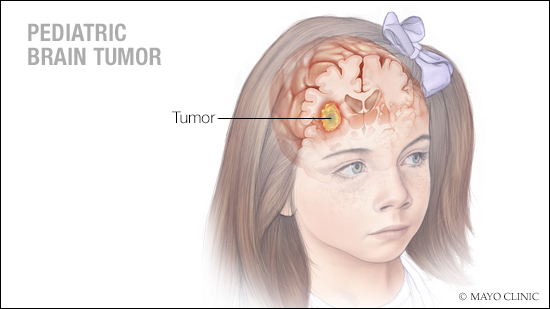-
Featured News
Ask the Mayo Mom: Tumor type, grade determine treatment for pediatric brain tumors

Treatment for brain tumors in children can differ from treatment for brain tumors in adults, so it is important to seek care from specialists in pediatric cancer and neurology.
Pediatric brain tumors are masses or growths of abnormal cells that occur in a child's brain, or the tissue and structures near the brain. Of the many types of pediatric brain tumors, some are noncancerous, or benign, and some are cancerous, or malignant.
Common brain tumors in infants, children and teenagers include:
- Gliomas
These tumors begin in the brain or spinal cord. Types of gliomas include pilocytic astrocytomas, ependymomas and oligodendrogliomas. - Medulloblastoma
A medulloblastoma is the most common cancerous brain tumor in children. It starts in the lower back part of the brain, called the posterior fossa, and tends to spread through spinal fluid.
Treatment and chance of recovery depend on many factors: the type of tumor, its location within the brain, whether it has spread, and the child's age and general health.
"The good news is that the really bad tumors are fairly rare," says Dr. David Daniels, a Mayo Clinic pediatric neurosurgeon. "When we look at tumors, we look at their type or classification, and then a grading that goes along with that."
Often, a biopsy of the tumor is performed to determine its type and grade. This information helps guide the course of treatment, which can include surgery, radiation therapy and chemotherapy.
"The biggest thing is that grading," explains Dr. Daniels. "Is this a grade one tumor, which is very benign, or is this a grade four tumor, which is really aggressive? And so our treatment has to match the aggressiveness of that tumor, so to speak."
Because new treatments and technologies are continually being developed, several options may be available at different points in treatment. As part of the Mayo Clinic Children's Center, pediatric specialists in Mayo's Pediatric Brain Tumor Clinic work together as a team to develop an individual treatment plan for each child.
Typically, a pediatric neuro-oncologist specializing in brain tumors is the child's primary doctor. This doctor coordinates access to other specialists from the pediatric brain tumor treatment team, including pediatric neurology, pediatric neurosurgery, neuroradiology, pediatric endocrinology, neuropathology, pediatric radiation oncology, pediatric oncology, child psychology and pediatric rehabilitation.
On this Mayo Clinic Q&A podcast, pediatrician and Ask the Mayo Mom host, Dr. Angela Mattke, is joined by Dr. Daniels to discuss common pediatric brain tumors. Dr. Daniels covers treatment, including when surgery may be an option, and highlights the latest in brain tumor research.
_______________________________
For more information and all your COVID-19 coverage, go to the Mayo Clinic News Network and mayoclinic.org.







